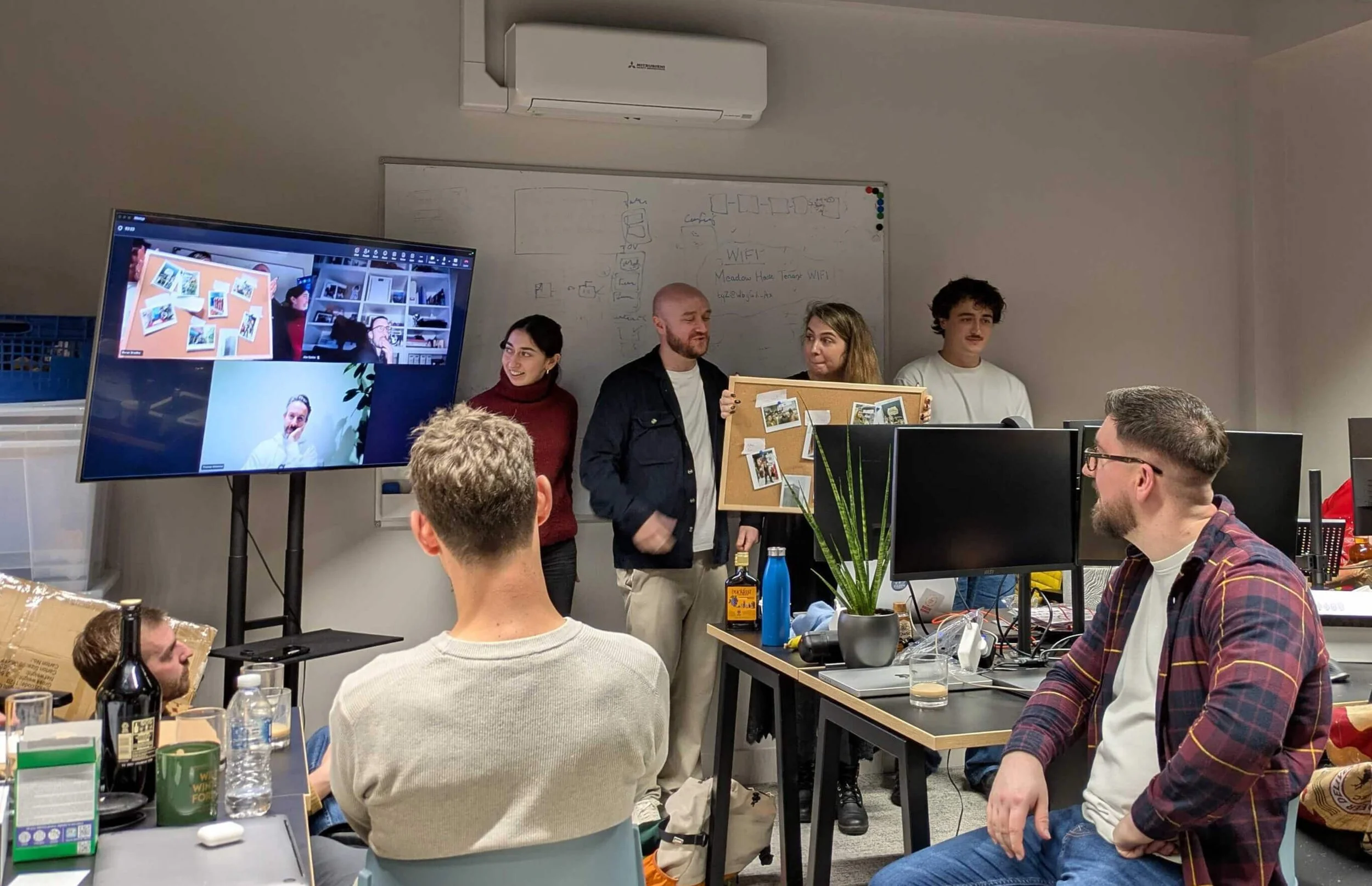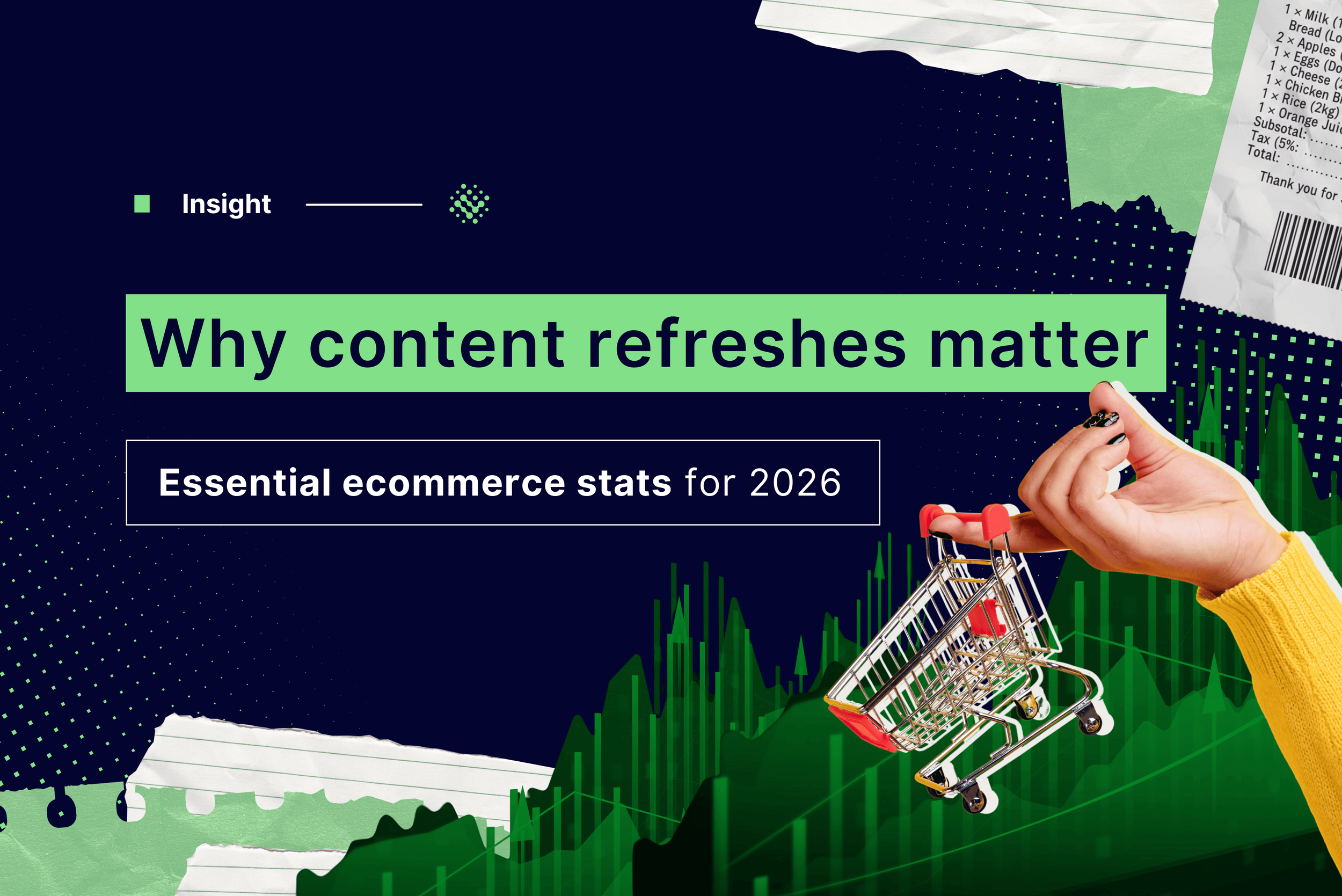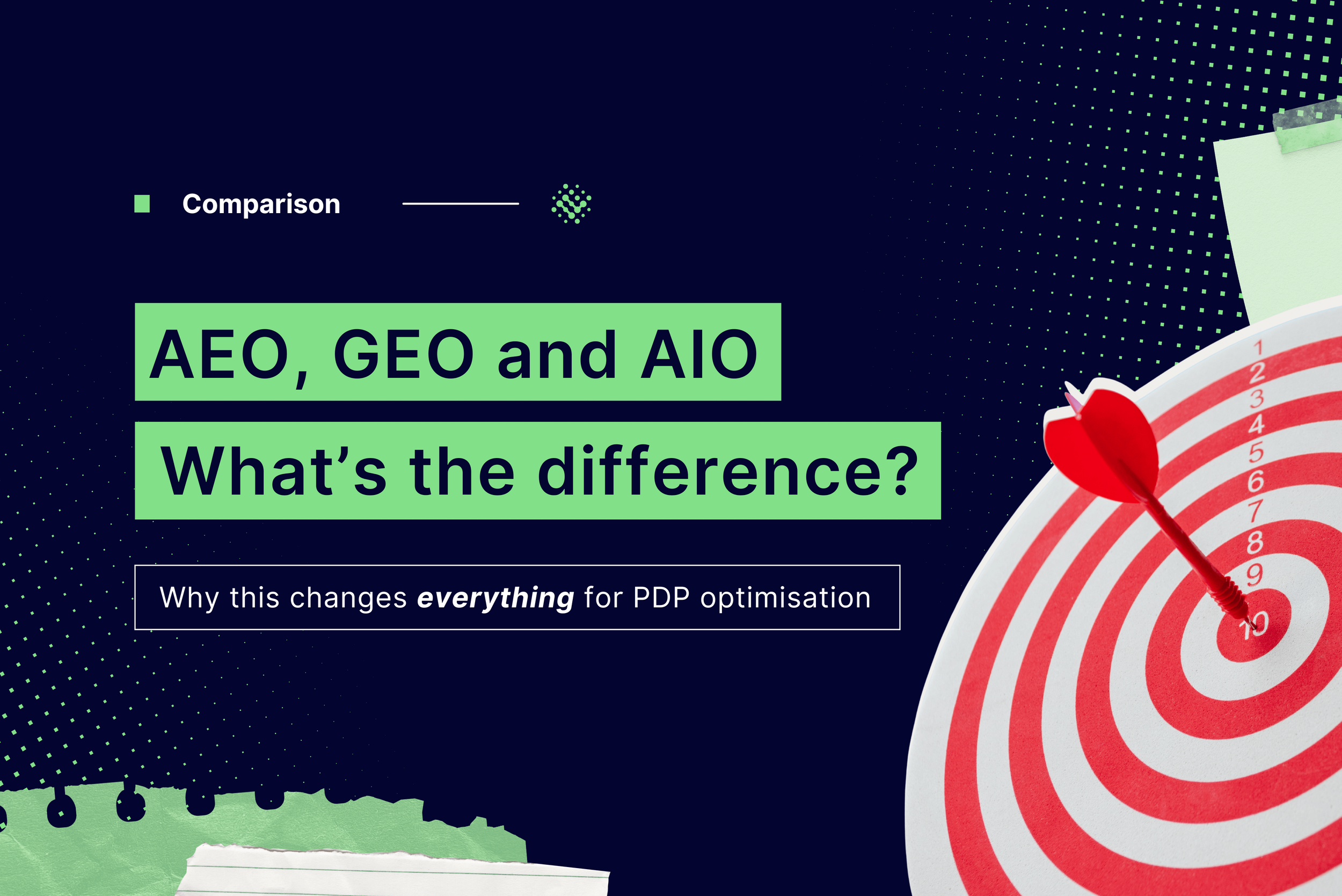Ocula vs ChatGPT: Which AI tool is best for Ecommerce?
Looking for a ChatGPT alternative? This ultimate guide compares ChatGPT with Ocula, a specialised AI copywriter for Ecommerce. The battlefield of choice? Product descriptions.
ChatGPT is quickly embedding itself into the fabric of our daily lives. It’s suddenly the go-to site for everything from trip-planning to technical troubleshooting. But if you’re an ambitious ecommerce team looking for a specialist product content generation solution, you may find that ChatGPT falls short.
Although ChatGPT is a great starting point for building product descriptions, it can take hours of manual refining and editing to bring that copy up to scratch across the board.
But what alternative AI product description generators are out there?
In this guide, we’ll compare ChatGPT with Ocula, an AI Copywriter specifically designed to deliver measurable ecommerce results. Ocula’s features include generating and optimising your on-page copy – including product descriptions, alt text, titles and specifications – as well as baking in SEO and comprehensive competitor benchmarking.
We’ll consider how ChatGPT and Ocula measure up against each other in terms of quality and accuracy, scalability, configurability, and overall time saved.
By the end of this guide, you should feel equipped to make an informed decision about which AI tool is better for your Ecommerce team.
Is there a ChatGPT alternative for Ecommerce?
These days, ChatGPT seems to be everywhere: it suggests last-minute recipes, creates first drafts in seconds, and even helps your kids with their homework. It’s an AI jack-of-all-trades… but world-class product pages aren’t one-size-fits-all.
Whilst ChatGPT is a generic AI that’s great at tidying up initial ideas, it isn’t trained or designed for Ecommerce optimisation at scale.
To maximise the value you get from an AI product content tool, you could consider:
The tool’s configurability – its content should match your brand’s formatting, tone of voice, and other important guidelines
How much you trust the reliability and quality of the generated content
How the tool performs at scale
Whether it automates SEO and keyword optimisation, including analysis of high performing competitors
The amount of time invested – including set-up and integration, plus manual revision of any AI-generated material
We’ll use these five indicators to compare the respective value that ChatGPT and Ocula can offer your Ecommerce team.
Ocula: The ChatGPT Alternative for Ecommerce
Ocula is the specialist Ecommerce AI copywriter that we’ll be comparing to ChatGPT in this guide.
In brief, Ocula is an agentic AI tool that optimises product listings across your D2C, retailer sites and marketplaces to drive traffic uplift. Unlike ChatGPT, Ocula was created specifically for Ecommerce and travel retailers. This means it’s been trained on millions of Ecommerce PDPs, and is capable of highly tailored, bespoke copy that drives conversions by 10%+.
When you log into Ocula, the first thing you’ll see is this dashboard:
At a glance, you see scores for your site’s content, accessibility, and technical performance.
These scores are calculated based on the number of errors and opportunities the Ocula AI detects across your site’s Product Detail Pages.
You can also view how your PDPs rank compared to your competitors’ – and why.
Scrolling down the page, you can filter your PDPs by category. You’re able to input different guardrails and guidelines for each of these categories, so that Ocula produces custom content for each specific set of requirements.
Clicking through to the Beauty category, Ocula compares your content score to the score of your highest ranking competitor. In the above screengrab, the example company scores highest on title and specs, but significantly lower than its competitor in terms of description quality.
The amber opportunity score reveals that there are 2,713 areas where the Beauty category’s content could be optimised for better conversion or discoverability.
Let’s use Ocula to take these opportunities on board.
Clicking through to a specific PDP, we can see that The Ordinary Azelaic Acid Suspension has an overall content score of 40, with 2 errors and 18 opportunities.
Ocula’s AI content generator optimises the product’s title by increasing the number of keywords and overall word count. This more than doubles the potential search volume of the PDP from 14,112 up to 36,387.
Alongside the title, Ocula also generates SEO-optimised copy for your description, specs, and any alt text.
So, that’s Ocula in a nutshell. But how does this AI copywriter for Ecommerce compare with ChatGPT?
To recap, we’re considering the two AI tools in terms of their configurability, quality, scalability, SEO capabilities, and the overall time you’ll save.
If you’re already familiar with ChatGPT and know it isn’t right for your team, you can book a free, no-commitment demo here to learn more about Ocula over a call. For an in-depth comparative breakdown, read on!
Configurability: ChatGPT vs Ocula
ChatGPT
Whilst ChatGPT is first and foremost a generic AI chatbot, it can still be configured to meet specific Ecommerce brand requirements – to a limited extent. The more rules or product descriptions that ChatGPT is asked to generate, the less consistency you’re likely to see.
Generating Ecommerce content with ChatGPT generally requires significant time investment from a human content editor, who manually alters each description to ensure accuracy. At scale, this process becomes a huge time-sink.
It’s also common for ChatGPT to “hallucinate” – that is, produce false or misleading information – if a user tries to stack too many requirements in one prompt.
Ocula
Ocula automatically ensures all tone-of-voice, brand guidelines, keyword and formatting requirements are reliably adhered to; nothing is too complex. Its configurability makes it ideal for teams managing diverse product ranges.
Whilst giving ChatGPT too many requirements can lead to hallucinations, Ocula’s proprietary chain-of-thought approach ensures that client requirements are automatically atomised and fed to Ocula’s AI copywriter step-by-step. This ensures that Ocula reliably meets complex and varied copy requirements, with no additional time invested by the user – and no unexpected additions or inaccuracies. Every piece of copy produced by Ocula is unique.
ChatGPT does not take this methodical approach, and so struggles to handle multiple rules or requirements.
Winner: Ocula
Reliability and quality: ChatGPT vs Ocula
ChatGPT
Whilst ChatGPT is a well-loved brainstorming tool, it isn’t built to produce high-performing PDPs without significant human input. An Ecommerce content specialist must manually edit and polish ChatGPT’s copy.
At the same time, ChatGPT sometimes introduces inaccuracies into product descriptions, or ignores important aspects of brand identity altogether. This is especially true if ChatGPT is asked to stick to several rules at once, with different rules for multiple complex categories. Its data may also be out-of-date.
The more PDPs that ChatGPT generates, the more you’ll notice a tendency towards repetition. Unfortunately, it has plenty of tells that alert shoppers you’re relying on it for content generation. ChatGPT’s overuse of em-dashes is well-documented, and it tends to rely on oddly corporate jargon like “elevate” or “supercharge”. Or, it will just sound… well, kind of weird. “Experience the timeless fusion of form and function with this lovingly handcrafted paperclip”… Anyone?
Ocula
Ocula’s copy generation has been fine-tuned on millions of Ecommerce PDPs. This ChatGPT alternative takes a highly robust, two-part approach to Quality Assessment, with both AI and computational-based quality checks. Its generation is rooted in up-to-date, real-time data you know you can trust.
At the same time, Ocula never automatically pushes any content live without permission. So if you’d prefer to check over its generated content with a human eye, you can.
Winner: Ocula
Scalability: ChatGPT vs Ocula
ChatGPT
Designed for single tasks, ChatGPT is not intended to be used at scale. Ecommerce teams utilising ChatGPT must generate content one-by-one.
Ocula
Ocula’s AI Copywriter was built for scale, generating and optimising thousands of PDPs in real-time. The ChatGPT alternative is a fast and painless no-code solution, that easily integrates with your existing setup. Outputs are automatically formatted to match your specifications.
Winner: Ocula
SEO: ChatGPT vs Ocula
ChatGPT
ChatGPT can provide general keyword suggestions, but lacks the deep SEO integrations required for comprehensive keyword research. It is capable of using data from publicly available sources – like your site or your competitors’ – to generate a downloadable CSV with keywords organised by category. However, it does not have a rigorous keyword selection process, and explicitly recommends utilising external tools like Semrush for a more accurate result.
Ocula
Ocula automatically runs keyword research for all PDPs – with no further effort involved. Like ChatGPT, it makes use of publicly available sources such as competitor sites, but also allows you to input large proprietary datasets. It automatically takes factors such as keyword difficulty and domain authority into account, injecting relevant keywords into generated copy without sacrificing tone of voice or other brand requirements.
In contrast to ChatGPT, Ocula’s AI Copywriter automates the manual keyword research process by independently accessing tools like Semrush. The best performing relevant keywords are then incorporated into your generated copy.
The prioritised keyword lists for each product detail page can also be directly exported from the Ocula platform.
Winner: Ocula
Time Saved: ChatGPT vs Ocula
ChatGPT
While ChatGPT generates drafts quickly, significant time must be spent revising, prompting, and integrating the content on an individual basis. Keyword research and competitor analysis also require external tools and substantial manual effort.
Ocula
Ocula saves days and weeks of writing, editing and integration by producing content that’s ready to go! Its optional no-code integration with your PIM system means that content can be bulk-uploaded with ease. No IT involvement is required during set-up.
Winner: Ocula
So, is Ocula a better ChatGPT alternative?
The scores are in. When selecting the best fit for your content generation needs, it’s important to consider your individual goals and requirements.
Whilst ChatGPT is a better generalist AI copywriter, Ocula’s tool has better configurability, reliability, scalability, SEO, and time efficiency for Ecommerce teams.
Ocula’s specialist capabilities makes it the better choice for:
Creating high-quality, publishable product content at scale
Adhering to complex brand guidelines
Automating SEO and competitor analysis
Interested to learn more? Book a demo below and receive free samples of Ocula’s AI copywriter in action, tailored to your brand’s PDPs.










